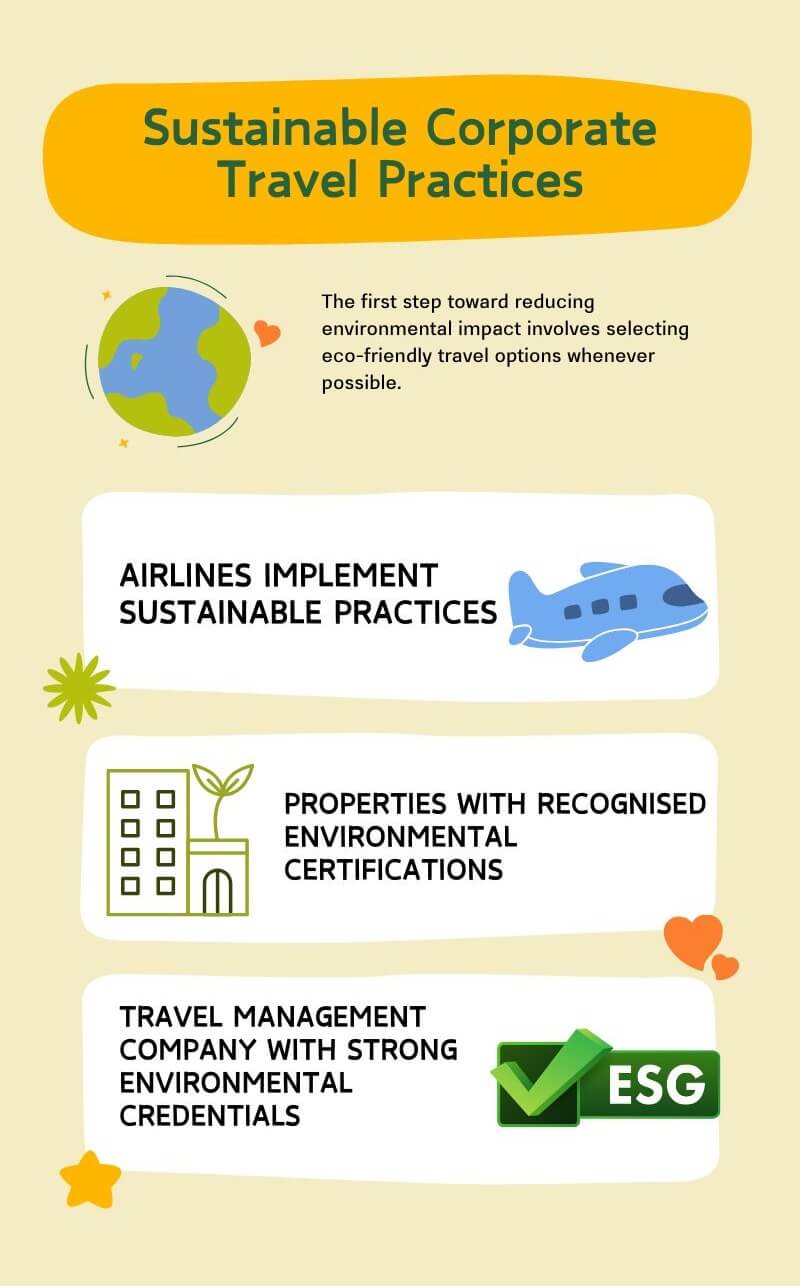The travel industry faces mounting pressure to address environmental concerns as climate change impacts become increasingly visible.
Business travel accounts for a significant portion of global carbon emissions, with a single long-haul flight producing more CO2 than many people generate in months of daily activities. This reality places sustainability in corporate travel at the forefront of both environmental responsibility and business strategy.
Why is Sustainability Important for the Travel Industry?
Beyond the obvious environmental benefits, sustainable practices help companies reduce costs, meet regulatory requirements, satisfy stakeholder expectations, and maintain competitive advantage in a marketplace where green credentials increasingly matter. Travellers now expect companies to demonstrate environmental responsibility, with many employees preferring to work for organisations actively addressing their ecological impact.
Companies that embrace sustainability in corporate travel often discover unexpected benefits.
These include stronger relationships with environmentally conscious clients, improved corporate image, and greater employee satisfaction. As environmental regulations tighten globally, businesses that have already incorporated sustainable practices into their travel programs will find themselves ahead of compliance curves rather than scrambling to adapt.
Green Travel Options for Business Travellers
The first step toward reducing environmental impact involves selecting eco-friendly travel options whenever possible. Several airlines have invested substantially in newer, more fuel-efficient aircraft that produce fewer emissions per passenger mile. Some carriers also use sustainable aviation fuels for a portion of their flights, significantly reducing the carbon intensity of air travel.
When booking accommodation, look for properties with recognised environmental certifications such as LEED, Green Star, or EarthCheck. These hotels typically implement comprehensive sustainability programs covering energy efficiency, water conservation, waste reduction, and responsible sourcing. Many now offer carbon-neutral stays through offset programs integrated directly into their booking systems.
The importance of sustainability in corporate travel becomes particularly evident when considering the cumulative impact of these choices. A company with hundreds or thousands of travel days annually can substantially reduce its carbon footprint by consistently selecting greener options. Your travel management company can help identify suppliers with strong environmental credentials and negotiate contracts that reflect your sustainability priorities.



Practices That Reduce Your Airline Carbon Footprint
The first step toward reducing environmental impact involves selecting eco-friendly travel options whenever possible. Several airlines have invested substantially in newer, more fuel-efficient aircraft that produce fewer emissions per passenger mile. Some carriers also use sustainable aviation fuels for a portion of their flights, significantly reducing the carbon intensity of air travel.
When booking accommodation, look for properties with recognised environmental certifications such as LEED, Green Star, or EarthCheck. These hotels typically implement comprehensive sustainability programs covering energy efficiency, water conservation, waste reduction, and responsible sourcing. Many now offer carbon-neutral stays through offset programs integrated directly into their booking systems.
The importance of sustainability in corporate travel becomes particularly evident when considering the cumulative impact of these choices. A company with hundreds or thousands of travel days annually can substantially reduce its carbon footprint by consistently selecting greener options. Your travel management company can help identify suppliers with strong environmental credentials and negotiate contracts that reflect your sustainability priorities.
Carbon Offsetting Programs for Travel Emissions
Carbon offsetting allows companies to compensate for unavoidable travel emissions by funding projects that reduce greenhouse gases elsewhere. These programs support renewable energy development, reforestation initiatives, methane capture from landfills, or energy efficiency improvements in developing regions. While offsetting doesn’t eliminate the original emissions, it provides a balanced approach to environmental responsibility when travel proves necessary.
When evaluating carbon offsetting programs, look for certifications from respected third-party standards like Gold Standard or Verified Carbon Standard. These certifications ensure that offset projects deliver genuine environmental benefits and wouldn’t have happened without offset funding. Many travel management platforms now integrate carbon calculators and offset purchasing options directly into their booking tools, simplifying the process for corporate travellers.
Some companies automatically offset all business travel emissions as part of their sustainability commitment, while others offer matching programs that encourage employee participation. Whichever approach you choose, clear communication about your offsetting strategy helps stakeholders understand how your business addresses its travel-related environmental impact and demonstrates your commitment to sustainability in corporate travel.



Developing Sustainable Travel Policies
Effective green travel guidelines embed sustainability considerations into every aspect of your travel program. Begin by establishing baseline measurements of your current travel-related emissions to identify hotspots and track improvement over time. Set realistic reduction targets based on business needs and communicate these goals throughout your organisation to build commitment.
Your sustainable travel policy should provide clear guidance on transportation choices, accommodation selection, meeting planning, and offset programs. Rather than creating absolute prohibitions that might face resistance, consider using a tiered approach that strongly encourages green options while allowing reasonable exceptions when necessary. Include sustainability criteria in your supplier selection process and communicate these expectations to your travel management company.
Alternative Transportation Solutions
Air travel isn’t always the most appropriate or environmentally responsible option, particularly for shorter journeys. High-speed rail produces approximately 75% fewer emissions than flying for comparable routes and often delivers travellers directly to city centres, reducing the need for additional ground transportation. Your sustainable travel policy might establish distance thresholds under which rail is preferred.
For local transportation at destinations, shared transport options reduce per-person emissions while often saving money. Corporate accounts with rideshare services can be configured to prioritise hybrid or electric vehicle options. Many companies now provide incentives for employees who choose public transportation over private cars, recognising both the environmental and cost benefits of these choices.
Vehicle selection presents another opportunity to support sustainability in corporate travel. Many car rental companies now offer hybrid and electric vehicles in their fleets. Your policy might prioritise these options and guide on selecting appropriately sized vehicles rather than defaulting to larger models with higher fuel consumption and emissions.



Virtual Meetings as a Sustainable Alternative
The most effective way to reduce travel emissions involves travelling less. Advanced video conferencing and digital collaboration tools now make virtual meetings viable alternatives for many business interactions that previously required travel. While face-to-face meetings are important for relationship building and complex negotiations, companies have discovered that many routine online discussions can occur effectively.
The environmental benefits of substituting online collaboration for physical travel extend beyond carbon emissions, including decreased waste generation, energy consumption, and resource use. Companies that successfully integrate virtual meeting options into their work culture often report productivity improvements and cost savings alongside their sustainability gains.
Partnering with Green Vendors
Your choice of travel suppliers significantly impacts your organisation’s environmental footprint. Working with eco-conscious partners who share your sustainability commitments helps extend your influence beyond direct company activities. When selecting airlines, hotel chains, car rental companies, and ground transportation providers, include environmental criteria in your evaluation.
Request information about potential partners’ environmental policies, certification status, and specific initiatives. Many corporate travel management companies now offer sustainability scoring for suppliers, making it easier to compare options objectively. Formalise these preferences in your supplier agreements and communicate your expectations clearly during contract negotiations.


Measuring Your Travel Environmental Impact
You can’t manage what you don’t measure. Implementing tools to track carbon footprint data provides visibility into your company’s travel-related emissions and helps identify opportunities for improvement. Many travel management systems now include built-in carbon calculators that automatically track emissions for booked trips, while standalone software can provide more detailed analysis.
Regular reporting on key sustainability metrics helps maintain focus on your environmental goals. Consider including travel emissions data in corporate sustainability reports, setting reduction targets, and celebrating progress. Some companies have begun integrating carbon budgets alongside financial budgets for departments or projects, creating stronger accountability for travel decisions.
Training for Sustainable Travel Practices
Employee behaviour significantly influences the effectiveness of your sustainability initiatives. Training programs that explain the environmental impact of different travel choices help build a culture of responsible business travel. These programs should cover practical tips for reducing emissions, guidance on using carbon calculators, and information about company offset programs.
Consider developing sustainability champions within your organisation who can provide peer guidance on green travel practices. These individuals receive additional training and act as resources for colleagues with questions about implementing sustainable travel policies. Recognition programs highlighting employees making environmentally conscious travel choices can also reinforce desired behaviours.

Looking Forward: The Future of Green Business Travel
As environmental concerns grow and technology advances, sustainable business travel will evolve. Emerging innovations like sustainable aviation fuels, electric aircraft for short-haul routes, and improved virtual reality meeting experiences promise to further reduce the environmental impact of necessary business interactions in the coming years.
Companies that demonstrate leadership in this area will likely gain competitive advantages as consumers, employees, and regulators increasingly prioritise environmental responsibility. The importance of sustainability in corporate travel will only grow as climate change impacts intensify and stakeholder expectations evolve.
By thoughtfully considering when travel is truly necessary, choosing the greenest available options, offsetting unavoidable emissions, and continuously improving your approach, your company can significantly reduce its environmental footprint while maintaining productive business relationships. Sustainability in corporate travel represents environmental responsibility and smart business practice in our changing world.



